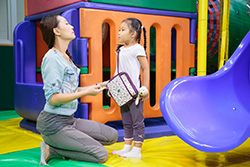Preschoolers often have difficulties in controlling their impulses and easily lose their temper. You can help your child develop self-control by using the following strategies.
Be a Role Model to Your Child
In everyday life, show your child how you plan to leave your pleasure until later, so that he understands how you enjoy the relaxed moment and your satisfaction when achieving the target. e.g. you will watch TV only after you have finished the laundry.

Show Your Child How to Stop and Relax When Facing Frustration
Some usual warning signs before your child's emotional behaviour:
- Clenching his fists
- Frowning
- Eyes reddened as if he is about to cry

It would be more effective if you detect these signs as soon as they appear and guide your child to relax before his emotions get out of his control.
- Guide your child to say “Stop” to himself to restrain his emotional impulses.
- Then help him to calm down by reflecting on his feelings. “I can see you're getting irritated by not getting what you want. Relax first and we shall see what we can do.”
- Teach him how to relax by slowly taking deep breaths while you are counting out for him.

Teach Your Child to Wait for What He Wants
Let your child learn to wait for what he wants in everyday life, e.g. asking him to wait for the snacks until you finish the phone call.


- Suggest your child to engage in some interesting activity while waiting
- The waiting duration should vary with your child's age and self-control ability
- Praise him for waiting patiently
Teach Your Child “Self Talk”
Teach your child self- talk to remind himself what is not right and what ought to be done. It can help him control himself and move forward to the next step. Example of self talk: “Mummy says leave the toys until after dinner”, “No hitting” or “Shake hands and make friends”.
Anticipate Consequences of the Actions
- Talk about rules and limits with your child to show him what are acceptable and what are not.
- Guide your child when necessary by stopping him and reminding him to follow the rules.
- Point out what he has done wrong and explain the corresponding consequence you give him, e.g. “You did not finish your homework within the agreed time. So you can't watch your favourite TV show tonight.”
- Praise him for his compliance and appropriate behaviours. He will gradually learn the social standards in different contexts.

